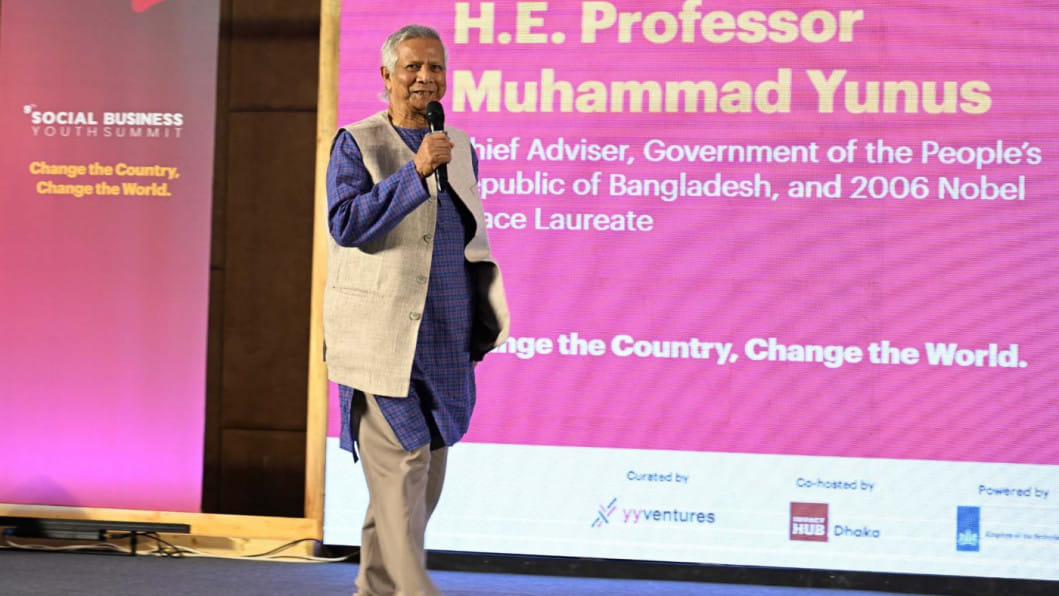Yunus calls for youth-led change through social business

Social businesses are designed to address societal needs rather than generate personal profit, Chief Adviser Professor Muhammad Yunus said today.
"Making others happy is a higher form of happiness," Yunus said, reflecting on the philosophy that drives social business.
While addressing the ninth Social Business Youth Summit at the InterContinental Dhaka hotel, Yunus highlighted how the Covid-19 pandemic had further exposed the flaws in the traditional business model and urged the world not to return to the old system.
"We have an opportunity to build a new engine—one that drives a more sustainable and equitable world," he stated.
Yunus reiterated the importance of imagination and action in achieving change.
"This is our mission: to create a new world. And we are committed to making it happen, step by step," he said, urging everyone in the room to continue moving forward and building the future they imagine.
"We can reshape the entire world within just a few years—with the people gathered in this very room. This is not a difficult task," said Professor Yunus, renowned for his pioneering work in social business and microfinance.
He made the comments at the summit, which gathered representatives from 25 countries, serving as a platform to highlight the importance of youth-led change and innovation.
Yunus began his speech by reflecting on the sacrifices made by the youth of Bangladesh during the July Revolution.
Over 1,000 young people lost their lives, while countless others endured severe injuries in their quest to overthrow a fascist regime.
Their vision of a new Bangladesh, Yunus said, was the catalyst for a nation that now stands as a testament to the power of youth-driven change.
"Every great journey begins with a single step, but the real challenge lies in how you progress to the next step," Yunus explained, drawing a parallel between the revolution of the past and the ongoing fight for a better future.
He described Bangladesh as a "living museum," where the dreams of the youth are embedded in the streets through murals and paintings that express the hopes and aspirations of a generation.
"This is a historical moment. Thousands of young people gave their lives and sacrificed so much to get us here, and their dream is now our shared mission—to create a new Bangladesh that echoes across the world."
Professor Yunus took a moment to welcome the international delegates and reflect on the significance of the summit.
"It's wonderful to be here again at the Social Business Summit. This year, we have an incredible turnout, with participants from 25 countries—what an amazing gathering," he said.
He also said the summit was more than just a conference; it was a chance for reflection and connection.
He welcomed the international delegates to the "New Bangladesh," emphasizing the country's transformation, which had been driven by the sacrifices and dedication of its youth.
Yunus pointed out that the murals on the streets of Dhaka were not just works of art but a living testament to the dreams and struggles of the young generation.
The conversation soon turned to the concept of building a new world, with Yunus asserting that it was far simpler than many might think.
"The thousand-mile journey begins with the first step," he noted. "You've already taken that first step by being here today. The question is, how do we improve with each subsequent step?"
Yunus shared several stories from his past work to illustrate how imagination and simple ideas could spark change.
Recalling his initial efforts in microcredit, he noted that what started as a small initiative to provide financial support to rural communities in Bangladesh has since evolved into a global movement.
Similarly, his campaign to provide a simple solution for treating diarrhoea—a homemade saline solution—had saved countless lives and transformed healthcare in rural Bangladesh.
He also spoke about the development of affordable housing, a project that led to the creation of a $500 house for low-income families.
This innovation earned recognition with the Dhaka Award for Architecture in 2008.
Yunus emphasized that these efforts were rooted in imagination and the desire to create practical solutions for societal issues.
The concept of social business, which Yunus championed, was another key point in his address.

 For all latest news, follow The Daily Star's Google News channel.
For all latest news, follow The Daily Star's Google News channel. 



Comments